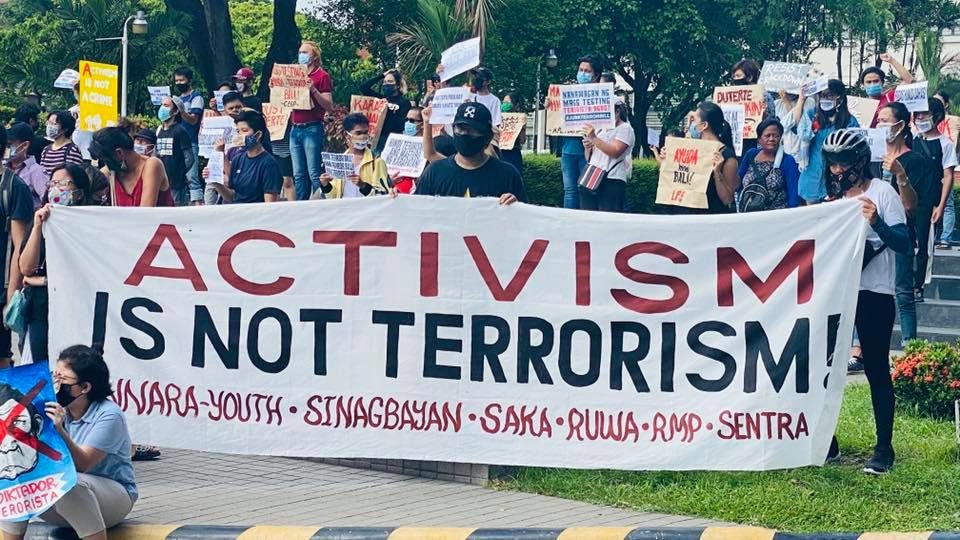The House of Representatives last night approved on the third and final reading House Bill 6875, or the controversial anti-terrorism bill, just two days after President Rodrigo Duterte certified the bill as urgent.
An overwhelming 173 lawmakers voted yes to the bill, while 31 voted no, and 29 abstained from the vote. The Senate already approved a similar version of the bill in February. Since both the House and Senate approved similar versions of the bill, it no longer needs to go through lengthy bicameral conference committee hearings, and will only need Duterte’s signature.
“No need for [a] bicameral conference committee since there are no disagreeing provisions. When approved on third reading, it will be an enrolled bill for the action of the president. He may sign, veto any or all provisions, or not act on the measure for it to lapse into law,” party-list Representative Jericho Nograles, one of the bill’s co-authors, said.
Read: Dude’s Got Priorities: Duterte certifies anti-terror bill urgent despite public protests
The proposed Anti-Terrorism Act of 2020 will repeal the Human Security Act of 2007, giving the Duterte government more surveillance powers over Filipinos, as it lengthens the punishment of up to 12 years to life imprisonment, people who will propose, incite, conspire, and facilitate “terrorist acts” against the Philippine government and its people.
Section 3 of the bill states that the government is allowed to conduct surveillance activities, which include “the act of tracking, following, or investigating individuals or organizations; or the tapping, listening, intercepting, and recording of messages, conversations, discussions, spoken or written words, including computer and network surveillance, and other communications of individuals engaged in terrorism.”
While section 25 mandates an Anti Terror Council to designate any individual, group of persons, or organization as terrorists if they find “probably cause.”
Human rights lawyer Mel Sta. Maria, the dean of law at Manila’s Far Eastern University, said that the bill is “dangerous” because it fails to give suspected terrorists the right to due process.
“The proposed law DOES NOT EXPRESSLY provide a procedure where the subject-person is given a chance to present countervailing evidence. There is no explicit provision mandating a hearing, much more the giving of prior-notice to the subject-person,” Sta. Maria said.
“Worse, probable cause is not proof beyond reasonable doubt, it is just based on reasonable probabilities…The bill, if passed into law, will be any despot’s deadly sword,” the lawyer added.
The bill’s passage has been widely criticized by Filipinos online for fears that it will curtail freedoms and violate basic human rights. Critics launched an online petition last week using the hashtag #Junktheterrorbill, asking lawmakers not to support the proposed law. As of writing, the petition has garnered over 560,000 signatures.
Despite the outcry, Presidential Spokesman Harry Roque assured the public that the tougher law to combat terrorism is not new and it is supposedly being imposed in other countries.
“There is no draconian provision there. All provisions are based on the laws of other countries that are effective in dealing with terrorists),” Roque said.
Earlier, the Commission on Human Rights (CHR) slammed the anti-terror bill as “highly intrusive,” warning that its broad definition of what constitutes terrorism could lead to abuse in power.
“The broad definition of ’terrorism’ in the proposed bill paves the road for possible abuse as it tends to blur the distinction between terroristic activities and ordinary crimes already punishable by the Revised Penal Code and other pertinent laws,” CHR spokesperson Jacqueline de Guia said.
“[A]uthorities could wantonly tag exercise of rights as terrorist expressions under this Act,” de Guia warned.
Activist groups like Sinag Bayan, meanwhile, have asked why the Duterte government isn’t focusing on solving immediate problems at hand.
“In the midst of the degenerative crisis of the Philippine economy and collapse because of the effect of Covid-19, why is Duterte’s government dealing with the haste to cease the Human Security Act of 2007? Shouldn’t he prioritize our economy and most of all the medical solution to fully intercept the virus that kills the lives of the people?”




